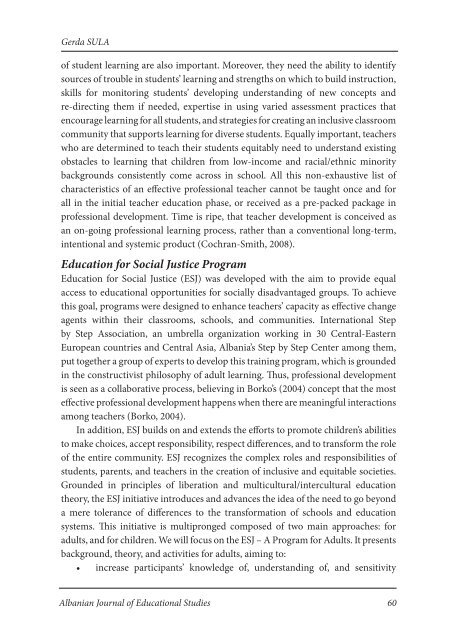Download - qendra per arsim demokratik
Download - qendra per arsim demokratik
Download - qendra per arsim demokratik
You also want an ePaper? Increase the reach of your titles
YUMPU automatically turns print PDFs into web optimized ePapers that Google loves.
Gerda SULAof student learning are also important. Moreover, they need the ability to identifysources of trouble in students’ learning and strengths on which to build instruction,skills for monitoring students’ developing understanding of new concepts andre-directing them if needed, ex<strong>per</strong>tise in using varied assessment practices thatencourage learning for all students, and strategies for creating an inclusive classroomcommunity that supports learning for diverse students. Equally important, teacherswho are determined to teach their students equitably need to understand existingobstacles to learning that children from low-income and racial/ethnic minoritybackgrounds consistently come across in school. All this non-exhaustive list ofcharacteristics of an effective professional teacher cannot be taught once and forall in the initial teacher education phase, or received as a pre-packed package inprofessional development. Time is ripe, that teacher development is conceived asan on-going professional learning process, rather than a conventional long-term,intentional and systemic product (Cochran-Smith, 2008).Education for Social Justice ProgramEducation for Social Justice (ESJ) was developed with the aim to provide equalaccess to educational opportunities for socially disadvantaged groups. To achievethis goal, programs were designed to enhance teachers’ capacity as effective changeagents within their classrooms, schools, and communities. International Stepby Step Association, an umbrella organization working in 30 Central-EasternEuropean countries and Central Asia, Albania’s Step by Step Center among them,put together a group of ex<strong>per</strong>ts to develop this training program, which is groundedin the constructivist philosophy of adult learning. Thus, professional developmentis seen as a collaborative process, believing in Borko’s (2004) concept that the mosteffective professional development happens when there are meaningful interactionsamong teachers (Borko, 2004).In addition, ESJ builds on and extends the efforts to promote children’s abilitiesto make choices, accept responsibility, respect differences, and to transform the roleof the entire community. ESJ recognizes the complex roles and responsibilities ofstudents, parents, and teachers in the creation of inclusive and equitable societies.Grounded in principles of liberation and multicultural/intercultural educationtheory, the ESJ initiative introduces and advances the idea of the need to go beyonda mere tolerance of differences to the transformation of schools and educationsystems. This initiative is multipronged composed of two main approaches: foradults, and for children. We will focus on the ESJ – A Program for Adults. It presentsbackground, theory, and activities for adults, aiming to:• increase participants’ knowledge of, understanding of, and sensitivityAlbanian Journal of Educational Studies 60


